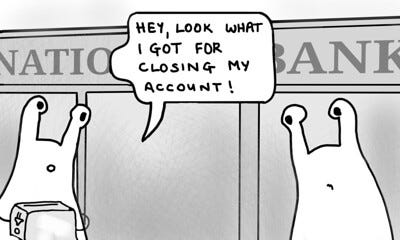Unbank the banked
Around the world there are hundreds of millions, billions of unbanked people. But why are so many people unbanked? It can't be because there is a shortage of banks as there are more banks, challenger banks, neo-banks and near-banks than you can shake a stick at. There must be some other problem and, as the old saying goes, where there is a problem there is an opportunity. It’s a pretty big opportunity, too. The Economist summarises the situation in America as follows: access to banks can be costly and seven million households are unbanked, relying on cheque-cashing firms, pawn shops and payday lenders.
So what should be done? Let’s start by talking about the people who want a bank account but can’t get one because they lack the necessary identification documentation or perhaps other skills needed to function in that mode (eg, literacy). These are the true unbanked. As Wired magazine pointed out, basic bank accounts (which are mandated by the UK government) are accessible to those with poor credit histories, while niche banks including Revolut and Monzo do not usually ask potential customers for proof of address in order to open an account. So it seems reasonable to ask why almost two million British adults still do not have a bank account, never mind adults in emerging markets!
Maybe it’s because banks don’t provide anything useful for them. Think about the large numbers of people who are banked (but also use the products and services provided by fintechs, such as myself) and the people who are underbanked: the people who have a bank account but don't really want it and don't use the services offered because the bank account is an 18th-century product designed for a bygone age. Professor Lisa Servon wrote “The Unbanking of America” about this a few years ago, based on her experiences working in a check-cashing operation in New York (I cannot recommend this book highly enough), and the bank experience hasn’t changed much since then.
There’s a very interesting take on all of this in Charlotte Principato’s note on “How the Roughly One-Quarter of Underbanked U.S. Adults Differ From Fully Banked Individuals” over at Morning Consult. This goes into the demographic details of the fully banked, unbanked and underbanked U.S. population and is serious food for thought. In her survey, underbanked people were defined as having done at least one of three activities with a provider other than a bank or credit union in the past year: purchased a money order, paid bills or cashed a check. It is interesting to note that most (58%) of underbanked consumers say they could manage their finances just fine without a bank!
We have a situation, in fact, where some of the banked, most of the underbanked and all of the unbanked are turning to alternative providers because banks cannot or will not deliver the services that these customers want. Let’s together label these the “underserved”. I think the majority of adults are now underserved (prove me wrong!) and therefore continue represent an astonishing range of scale and scope opportunities for non-banks.
Serve The Underserved
Bank accounts are quite expensive things to run (as they should be, because banks should be heavily regulated). In some countries the banks are forced to offer a basic bank account to anybody who can jump the identification hurdle to get one. But a great many of these customers won't be very profitable and it costs the banks a lot to serve them. Why continue to force banks to provide money-losing services to people who don’t want them anyway?
with kind permission of TheOfficeMuse (CC-BY-ND 4.0)
What the underserved need are not banks but new kinds of regulated financial institutions that deliver the modern services needed to support a 24/7 always-on economy. What are these services? As the economist John Kay noted in his recent paper on “A Robust and Resilient Finance” for the Korean Institute of Finance, while “many aspects of the modern financial system are designed to give an impression of overwhelming urgency… only its most boring part - the payments system - is an essential utility on whose continuous functioning the modern economy depends”.
In similar vein, in their new book "The Pay Off-How Changing the Way we Pay Changes Everything" Gottfriend Leibrandt (who was CEO of SWIFT from 2012 until 2019) and Natasha de Teran write that "while access to a banking system is seen as a crucial part of a country's development and necessary for lifting people out of poverty, it is not as basic a need as the ability to pay".
In other words, the fundamental need and the basis for inclusion in society is not a bank account or anything like it, but a safe and secure way to get paid and to pay for goods and services. And this is not a revelation! It seems to me that great many people would be well served by a simple digital wallet that might be provided by any of range of organisations from Facebook to Square. The goal of a modern and forward-looking strategy should be not to bank the unbanked but to unbank the banked.
(An edited version of this piece first appeared on Forbes, 11th September 2021.)
—
Are you looking for:
A speaker/moderator for your online or in person event?
Written content or contribution for your publication?
A trusted advisor for your company’s board?
Some comment on the latest digital financial services news/media?





